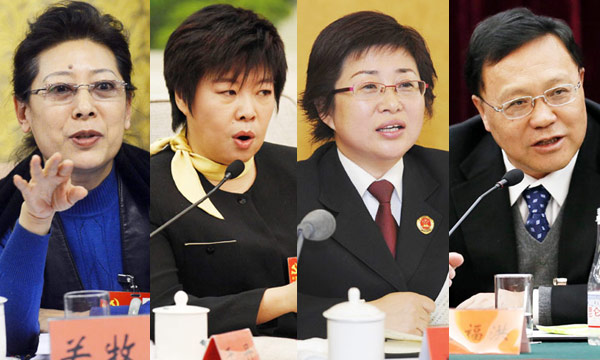Judge stresses importance of procedure
By Zhao Yinan (China Daily)
Updated: 2012-11-14 03:05
System 'is fair and just overall' as reflected in key measurements
A senior judge on Tuesday called for better enforcement of procedures to reduce the potential for erroneous judgments and raise judicial credibility.
Shen Deyong, vice-president of the Supreme People's Court and a delegate to the 18th National Congress of the Communist Party of China, called on courts to better protect and respect human rights.
Shen also highlighted the importance of proper judicial procedure during an online interview where he answered questions with Hu Zejun, deputy procurator-general of the Supreme People's Procuratorate, and Zhao Dacheng, vice-minister of justice.
The interview attracted hundreds of Web users and more than 700 questions were submitted during the two-hour program, almost double the originally allotted time.
"There are possibilities that cases were misjudged, and some judges may turn out to be lacking ethics. It is true in China as it is true worldwide," he said.
However, despite the subjective nature of the issue, there are measurements that can be used to gauge the fairness of the system, Shen said.
Courts, at all levels, heard 12 million cases in 2011 and more than 90 percent of litigants accepted the verdict and did not appeal to a higher court.
This percentage rose to nearly 99 percent when appeal verdicts were delivered, Shen said.
He said the number showed that, overall, the judicial system is fair and just and most litigants were satisfied.
"West or East, ancient or modern, there are no judicial systems that can utterly eliminate misjudgment, so it is important to set up a system to rectify any mistakes in time," he said.
In one case, Zhao Zuohai, a farmer from a village in Shangqiu, Henan province, received 650,000 yuan ($104,300) in State compensation in 2010.
Zhao was released after wrongly serving 10 years in prison when the victim he allegedly murdered reappeared. Zhao said he was tortured into pleading guilty.
Shen called on courts to strictly carry out the country's three major procedural laws and follow the required proceedings.
China has three major procedural laws for civil, criminal and administrative litigation.
Procedure was important, he said, because of the impression it gives litigants. If procedure was followed correctly they had more confidence in the system.
The Amendment to the Criminal Procedural Law will take effect in January, after an amendment to the Civil Procedural Law in September.
Lawmakers adopted these two revisions to update procedure.
Chen Weidong, a law professor at Beijing's Renmin University of China, said judicial integrity is important as it was the last line of defense for social fairness.
People might lose confidence in social justice if judges and prosecutors are not seen to be impartial.
Zhu Zhe contributed to this story.
Contact the writer at zhaoyinan@chinadaily.com.cn
Related Stories
Judicial credibility has to be improved first 2010-01-11 07:44
Hot words: Judicial reform 2012-10-10 15:47
Judicial reform in China 2012-10-10 08:06
Judicial reform to be gradual 2012-10-09 23:57
Lawyers' rights guaranteed in China's judicial reform 2012-10-09 11:27

Top News
A new generation of leaders
Xi's address to the media
World welcomes China's leadership change
Video







